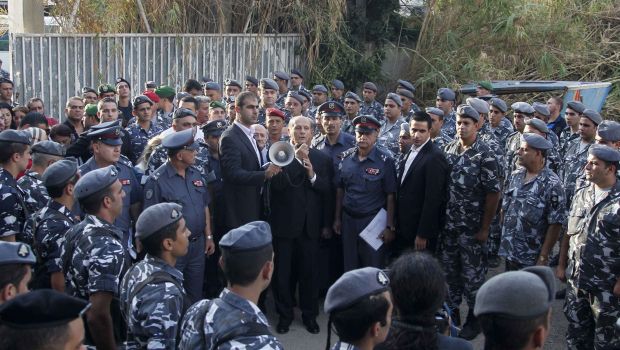
Lebanese Interior Minister Marwan Charbel (C) speaks to soldiers in Beirut’s southern suburbs on September 23, 2013 (REUTERS/Sharif Karim)
Paris, Asharq Al-Awsat—Lebanese Interior Minister Marwan Charbel warned on Wednesday that 2014 could bring more crises for the country, already reeling from the fallout of the war in neighboring Syria and its own turbulent internal politics.
Speaking to Asharq al-Awsat in Paris, Charbel said that Lebanon faced serious dangers focused on five events in particular, the impact of which “will be difficult for Lebanon to escape.”
He listed the dangers as the start of the Special Tribunal for Lebanon in January 2014, the Lebanese presidential election in six months’ time, forthcoming elections in Syria, the election of a mufti in Lebanon, and finally Lebanon’s own postponed parliamentary elections.
Charbel said each was linked, one way or another, to the Syrian issue and the military and political developments there. He added that what was certain was that “whenever matters improved for the regime in Syria, matters become more complicated in Lebanon,” because “the influence of Syria . . . will increase.”
Charbel likened the situation in Lebanon to a pregnancy with fatal complications: “The end result is a tough one, where either the mother dies, or the children die, or all die.”
Despite warning of dangers in the future, the minister dismissed the threat of sectarian violence in the wake of the recent bombing of the Iranian embassy in Beirut, saying instead that interfaith “relations became stronger temporarily” between all Lebanese who condemned the attacks.
However, Charbel warned that existing tensions between Alawites and Sunnis in the northern city of Tripoli could worsen, possibly leading to Shi’ite intervention to support the Alawites in Jabal Mehsin, or leading to a Syrian military intervention in the north and the displacement of residents in Akar, and a subsequent Sunni backlash.
The interior minister warned that such a scenario could eventually lead to an outbreak of violence which could engulf the entire country. He called on all Lebanese citizens to back the government’s security plan in Tripoli, which has already seen the deployment of the Lebanese army to keep order.
Charbel added that the security plan was the government’s only option, saying that everyone must understand that implementing it is the only way out of the crisis.
He told Asharq Al-Awsat that he discussed his concerns about Lebanon’s stability during his meeting with French Interior Minister Manuel Valls, whom he said expressed Paris’s concern for Lebanon’s future and the importance of distancing it from the repercussions of the Syrian war.
Charbel also discussed the presence of fighters affiliated to Al-Qaeda and the Al-Nusra Front in Lebanon. He said there were “persons or cells who did not pose danger to the country as long as they did not have a hierarchical organization or training camps inside Lebanon.”
Charbel went on to warn of the potentially catastrophic consequences of the presence of 1.2 million Syrian refugees in Lebanon, and the pressure they add to national infrastructure, the health and education systems, and the economy. He also warned of the effects on security, especially with the presence of both members of the opposition and supporters of the Syrian regime, who possessed arms and committed illegal acts.
He said it would have been better had Lebanon built refugee camps as Turkey and Jordan have, and warned that many of the refugees would not return to Syria when the war ends.
Charbel said there were doubts about the presidential elections being held in May 2014 as planned. He added, however, that the failure to hold the elections would lead to a power vacuum in Lebanon, which would also be dangerous.
